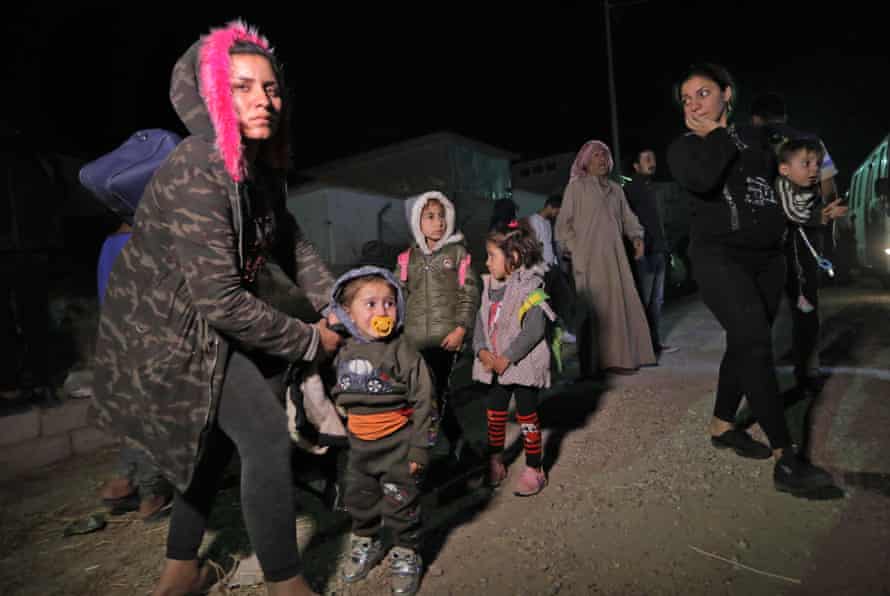The Guardian, originally published on Monday 1 Mars 2021.
By Kaamil Ahmed.
‘There is a huge amount of damage you can’t see – the mental trauma’, says Syria Relief report author.

Children take part in a kite event at a refugee camp in Syria’s Idlib region near the Turkish border. Photograph: Anadolu Agency/Getty Images
More than three-quarters of Syrian refugees may be suffering serious mental health symptoms, 10 years after the start of the civil war.
A UK charity is calling for more investment in mental health services for refugees in several countries after it found symptoms of post-traumatic stress disorder (PTSD) were widespread in a survey of displaced Syrians.
Syria Relief said refugees and people internally displaced by the conflict struggled to find support.
A survey of 721 Syrians living in Lebanon, Turkey and in Idlib in Syria’s north-west found 84% had at least seven out of 15 key symptoms of PTSD.
“I don’t leave the home at all, I just stay in the tent. Sometimes, I have episodes of stress where I feel like breaking everything and hit my husband,” said one woman in Lebanon, who did not want to be named.
She said she has struggled to recover from years of accumulating tragedy through the war, including the battle for Aleppo in 2015, losing a newborn child to illness and surviving an attempted rape by a man pretending to offer her work.
She was eventually referred to a doctor who prescribed her medication. She said it has been hard to find the medicine recently because of drug shortages in Lebanon.

A drawing of ‘bad things’ by a Syrian refugee child in a school in Hatay, southern Turkey, about 15 miles from the border with Syria. Photograph: David Gross/Alamy
According to Syria Relief’s report, only 15% of refugees in Lebanon say mental health support is available for them. Among displaced Syrians in Idlib the figure falls to 1%.
Only two out of 393 people who took part in the survey showed no symptoms linked to PTSD in Idlib, the last rebel stronghold against President Bashar al-Assad’s forces.
Ibrahim Hanano, a council member in the border town Tel al-Karameh, said there was a desperate need for support in rural areas like his.
“There are huge amounts of people who need this kind of support. I can’t even count them. There are people who are really unable to recover, they have severe psychological and physical injuries,” he said. “The only thing we can do is to try to document their situation so that if the local NGOs come to the area we will tell them.”
Ahmad al-Mousa, 24, was badly hurt when a barrel bomb hit his home in Tel al-Karameh in 2014. He said loud sounds, especially of aircraft overhead, still instantly trigger fear for him. He has not found any help for his condition.
“I can’t describe how I would feel if I could get rid of this issue, if I could recover fully, if I could feel equal to other people,” said Mousa.
Syria Relief’s head of communications and advocacy, Charles Lawley, the report’s author, said: “We have a lot more success in getting aid for physical issues like food or schools. This is the damage you can see from the war, but what I wanted to give a picture of is there is a huge amount of damage you can’t see – the mental trauma.”
Diana Rayes, a US-based researcher on mental health among displaced Syrians, said Syria Relief’s survey was not large enough to draw conclusions from, but showed the need for more attention to be paid to the issue.
“We know for a fact there’s been multigenerational impacts of PTSD and trauma on the population. We know this is going to affect the children born throughout the conflict,” said Rayes, a PhD candidate at Johns Hopkins Bloomberg School of Public Health.

Syrians displaced by Turkish military operations in north-eastern Syria arrive at a refugee camp near the Kurdish city of Dohuk, in Iraq’s autonomous Kurdish region, in October 2019. Photograph: Safin Hamed/AFP via Getty
She said it was important to address mental health and trauma, especially as many Syrians now feel the war has been forgotten.
“I don’t think the feeling of being forgotten makes things better. I think this is going to be a question for the future of Syria … it’s unlikely that Syrians will ever return to the country if they don’t feel they’ve reconciled with their trauma.”
More than 5.6 million people have fled Syria since 2011 and 6.6 million have been internally displaced.

